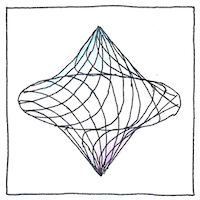Kurt Gödel
logic

|
Incompleteness theorems
To prove that arithmetic, or any system describing the natural numbers, can not be both consistent and complete, Kurt Gödel showed how to give a number to any logical proposition. Thus Gödel demolished the attempts of Bertrand Russell and Alfred Whitehead to prove that arithmetic was logical which is not to say that arithmetic isn’t useful, that is, computational, or simple.
Time travel
Gödel discovered an inconsistency in the U.S. Constitution, that would allow the government to become a dictatorship. Wanting to share this almost kept him from becoming a citizen. Gödel developed an exact solution to the field equations of Einstein’s theory of general relativity that allows a form of time travel along closed time-like curves. Gödel gave this to Einstein as a present on his 70th birthday, which disconcerted Einstein, who began to doubt his equations. When the ghost of Hamlet’s father urges Horatio and Marcellus to swear to keep secret his appearance and Hamlet’s plan to avenge his father, Horatio says “this is wondrous strange,” and Hamlet says, “There are more things in heaven and earth, Horatio, than are dreamt of in your philosophy.”
Self-contradictory statements and tautologies
The key to Gödel’s inconsistency theorems is the analysis of the sentence G that asserts: “G cannot be proved within number theory.” If I were to say, every man is a liar, knowing I am a man, could you believe me? Statements like that might be neither true nor false or both true and false or true only for a moment. Good Indians always tell the truth, and bad Indians always lie, but they look nearly alike— unlike Cretins who always lie— and unlike ourselves, who sometimes lie and sometimes tell the truth, but usually don’t know what to say— whereas you may ask any Indian “Are you a good Indian?” and always get the same answer. I always say I’m a good Indian, and I’m proud of my humility. At least my intelligence is not artificial. I mean, good is good, and bad is bad, but too much is too much. I usually intend that statement to be funny, not ambiguous, unlike what I might say in my sleep or in a really serious poem. I intend every complexity here to be completely understandable. Every thought you might have about the ideal poem would be implicit in it. Speaking of which, never take two clocks on a voyage. If they disagree, there’s no way to decide between them. Always take one or three. Just so, we continue our trip.



The holy grail of logisticians was to be able to prove that any mathematical proposition was either true or false. Kurt Gödel was able to show, using logic alone, how silly this pursuit was.
In the 1940s at Princeton, after Gödel.” and Einstein became close friends, Einstein confided that his “own work no longer meant much, that he came to the Institute merely . . . to have the privilege of walking home with Gödel.”
See also in The book of science:
Readings in wikipedia: